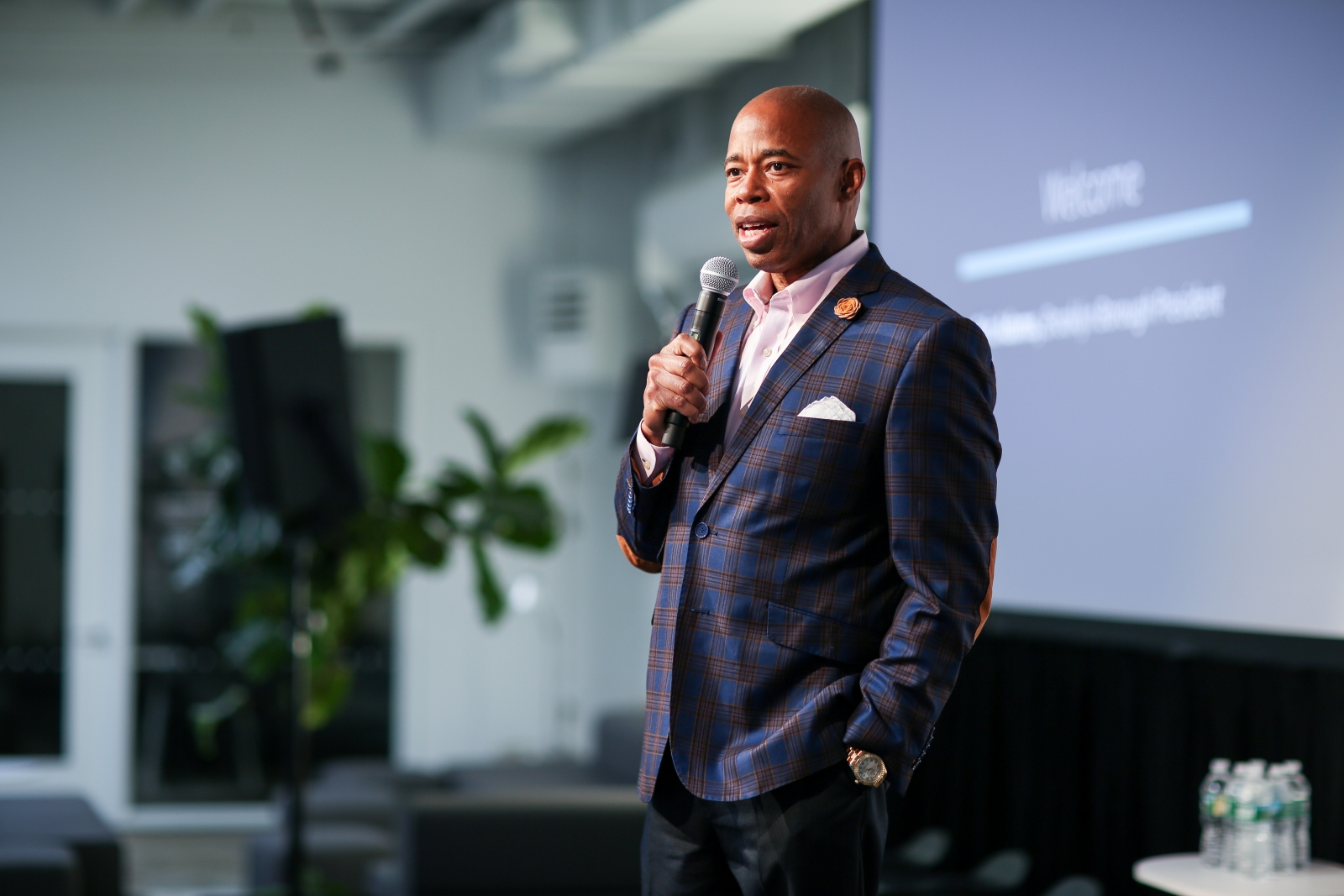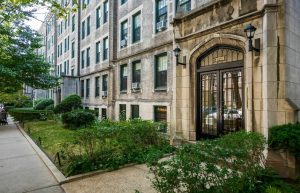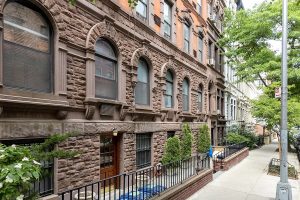
Brooklyn Borough President Eric Adams at StreetEasy’s Brooklyn First-Time Buyers’ Series.
This past weekend, we hosted StreetEasy’s Brooklyn First-Time Home Buyers’ Series, our first event tailored specifically for Brooklyn home shoppers. The event ended with a lively Q&A with our five real estate experts. We couldn’t get to all of the audience questions during the event, so we’ve answered the majority of the remaining questions here.
There were so many questions we had to break them into separate categories. To jump directly to the answer to your question, use the handy category links below.
- The market
- Condos and co-ops
- Due diligence and negotiating
- Home financing and mortgages
- Assembling your home buying team
- Other questions
The Market
Will there really be enough inventory for it to become a buyer’s market?
In the third quarter alone, more than 11,000 new homes hit the New York City sales market. Sales inventory was up 12 percent across the city, and up 16 percent in Brooklyn since this time last year. With this surge of homes on the market, we also see stagnating prices, dipping home sales, and rising price cuts – all market signals that favor buyers over sellers. — Grant Long, StreetEasy Senior Economist
With so much new inventory in Brooklyn, will prices fall in the next two years?
Right now, prices are stagnating year-over-year in Brooklyn, with the StreetEasy Price Index sitting at roughly $720,000. If current market dynamics continue and the supply of homes for sale continues to outpace the demand from buyers, you can expect to see some downward pressure on prices in the next few months and years. The question will be just how far they’ll dip. — GL
You mentioned the cost of buying at typically around 10% of the property value. What is the breakdown of that?
The 10 percent figure is an estimate on how much it will cost you to buy and then sell. Closing costs are dependent on the purchase price and type of property you are buying into. When you are the buyer of a co-op, your closing costs are minimal; with a condo, you will need to be prepared for mortgage recording tax at almost 2 percent of the mortgage amount, a mansion tax of 1 percent for sales at $1 million and up, and a title insurance cost of about $450.00 per $100,000.00 of the purchase price. On top of this, you will need to factor in costs for your attorney, the bank attorney, and condo application fees. — Rosalind Ting Kwast, Esq. of Kwast Law, PLLC
Condos and Co-ops
Are taxes always built into the maintenance in co-ops?
Yes. This is why it might seem that maintenance is higher than for a similarly situated condo unit; the condo unit owner pays the real estate taxes separately from the common charges. — RK
What is the best way to understand a building’s sublet policy? How do sublet policies differ between condos and co-ops?
The best way would to be receive a copy of the sublet policy during the due diligence period. Condominiums typically have only one restriction for subletting, and that is that the lease term must be for at least 6 months to one year. On the other hand, co-ops, if they allow subletting at all, tend to do so with many limits. Some co-ops only allow it for a maximum of two years over any five-year time period; some only allow it if you give a portion of your rental income to them as a fee. Others only allow it after you have lived in the unit for five years. — RK
Do co-ops generally require 20% down payment, regardless of your financing and accepted offer?
Co-ops generally require a down-payment of 20 percent and in stricter buildings up to 30 percent. Some high-end buildings require up to 50 percent down. — Richard Barenblatt, mortgage banker, Guardhill Financial
Do renovations make a difference in terms of sale price in Brooklyn (update, carving out another bedroom, etc.)? What are the pros and cons of buying a fixer upper versus a fully renovated place?
Absolutely. A turn-key home is always going to command a higher price than a fixer-upper or a home that’s not newly renovated. And with respect to layout, the ability to add an additional bedroom, bathroom, or washer and dryer in unit, etc., will also add a premium to the sale price. — Aaron Seawood, buyer’s agent, Compass
If you purchase a fixer-upper, be prepared to put up with the inconvenience of repairs. The pros of a fully renovated place, if it’s a new development, is a warranty on things like appliances and roof. In both cases, we would suggest having a home inspection. Don’t assume that a new development is without defects. — Tyrone McDonald, Neighborhood Services of Brooklyn
Is it a good idea to buy a 2-3 family house in Brooklyn and be a landlord while leaving in one of the units?
It depends on your goals and what your comfortable with. We would strongly suggest that you have some form of landlord training so you are aware of things like New York City regulations, screening tenants, the Fair Housing Act, tenant rights, etc. Your two-to-three-family unit is a business; treat it as such. — TM
Being an owner-occupied property, you would qualify for the best interest rates while earning rental income from the other units. — RB
Why are property taxes on condos/co-ops so much more than on 1-3 family homes?
The assessment ratio which determines your tax amount is higher for condos and co-ops than for 1-3 family homes. The assessment ratio is a percentage of your market value. — RK
What is the property tax rate in Brooklyn?
The property tax rate depends on what class the property is classified as. From there, the rate is multiplied by your billable assessed value (which is a percentage of your market value). The property tax rate for class one (1-3 family homes) is 20.385 percent, and the property tax rate for class two (co-ops, condos, rentals) is 12.719 percent. This rate is the same in Brooklyn and Manhattan. — RK
What are the best resources for researching sponsors — who is reputable and who is not?
The New York State Attorney General provides an offering plan data search which makes available the full names of the sponsor members for each offering plan filed with the state. — RK
Due Diligence and Negotiating
What are the type of negotiating points one can raise with the seller?
The obvious one is price reduction, either due to comps or condition. Others include a credit at closing for defective items identified in an inspection, offering to let a seller stay in the unit post-closing at a predetermined rent (this would give a buyer a distinct advantage in certain scenarios when bidding on a place), and when dealing with a sponsor, asking them to pay their own attorney fees and transfer taxes. — AS
At what point in the process do you learn the building’s financials?
Your attorney should learn about the financials during the due diligence process, which happens during the time the contract is being negotiated and before it is signed. You should then get the information from your attorney before you sign the contract and remit your down payment. — RK
What contingencies are essential?
If you need a loan in order to make the purchase, you must have a financing contingency in place. Moreover, you will want your attorney to make sure they also add a funding contingency to account for any item that might come up after a commitment letter is issued but prior to the actual closing. — RK
An inspection is also a must, and your buyer’s agent can guide you on whether it should be included as an actual contingency depending on the temperature of deal. — AS
What reports does the first-time home buyer receive about their property? Lead paint report, others?
Under New York State’s Property Condition Disclosure Act, sellers of 1-4 unit properties have the option of disclosing certain information about the property, lead included, or providing a $500 credit at closing to the buyer. Most opt for the $500 credit. The credit is meant to encourage the buyer to have a home inspection. Keep in mind that the seller is only required, if they opt to complete the disclosure form, to indicate if they were aware of lead being present in their home. — TM
When you see a tax abatement in place, how do you determine what the taxes will be when it expires?
You will not be able to predict the exact amount the taxes will be when they expire. However, you can note what the taxes would currently be without the abatement, and know that generally, there is a limit on how much the assessed value can increase each year, so high tax increases are somewhat rare. The real estate taxes at the time of the expiration of the abatement will be based on the assessed value at that time (a percentage of the market value), multiplied by the tax rate. — RK
Home Financing and Mortgages
If a mortgage broker is used, is it one credit inquiry for each application or is it multiple inquiries?
If you go to a mortgage broker, that’s correct. They will check your credit and whichever lender they send the loan to will also check your credit. However, if you go to a mortgage banker, it’s only one credit check in most cases. — RB
Does mortgage preapproval expire? If so, how long does it last?
Every lender is different. Typically it’s 120 days. If your loan is considered a jumbo, it’s usually 90 days. — RB
I’m seeing much better rates from the online sites for mortgages. You said not to ever use the robo sites but what if they offer the best rates by far?
The interest rate you see online is an advertisement. It does not necessarily mean you will secure that rate. Do your due diligence, research customer reviews, and speak to a loan officer before deciding. — RB
What are typically the reasons for a retail bank not to approve a loan?
When income, credit, or liquid assets do not meet their guidelines or the property being financed does not meet their guidelines. — RB
Are there income restrictions to get a SONYMA loan?
SONYMA has various loan products and income restrictions are based on the city and town you reside in. For a complete list of income limits, go here. — TM
How does a 401K first home buyer loan that you will repay affect underwriting? Is there a stigma attached to it for the seller?
Some lenders will use the monthly payment in order to pay back the loan in your debt-to-income calculation. No stigma to the seller. — RB
Assembling Your Team
What are some signs I should fire my buyer’s agent? (How do I assess their expertise; how much legwork should they initiate versus what I should initiate?)
Some surefire signs: It doesn’t feel right working with them; they’re rarely available; they’re not able to easily source adequate answers to your questions; they always seems like they want the home more than you do.With respect to legwork, a great buyer’s agent should mirror your urgency and effort. — AS
What are the risks of buying with a dual agent?
The primary risk is forfeiting undivided loyalty. The buyer is essentially agreeing that the listing agent will help both buyer and seller come to a meeting of the minds from a neutral place. The buyer must feel comfortable that the listing agent is genuine and can actually operate in that capacity. — AS
Is it basically mandatory to secure legal representation when purchasing a home in NYC?
In New York, you are required to secure legal representation when purchasing a home. — RK
Can you work with multiple buying agents or do you have to pick one?
Technically you can, and I would advise that you instead “interview” multiple buyer’s agents and lock in with one whom you connect with and who meets your needs. During the course of your search, your buyer’s agent gets to know your likes and dislikes in real time, and as your priorities change (as they often will), they will be best positioned to help you secure a place much faster. — AS
When is the right time to “assemble the team” to buy a new development that is still under construction?
I would treat this the same way as a resale — the team should be assembled as soon as possible when you decide you are ready to buy. Many contracts for these new developments are entered into while the buildings are still under construction. — RK
What costs are associated with using a mortgage broker?
There can be an application fee. The lender pays the mortgage broker a commission, the borrower does not. — RB
How do I choose the right buyer’s agent out of all the buyer’s agents in NYC?
Start with referrals from trusted sources, ideally someone who actually used the services of said buyer’s agent. Reviews on Zillow, LinkedIn, Google, et al. will also help narrow the field. Once you have a short list, asking the right questions and getting the right answers will ensure that you are working with the right buyer’s agent. — AS
Other Questions
Anything to keep in mind as a foreign buyer on a visa or green card?
The greatest concern is when you sell, as you would be subject to a 10-15 percent FIRPTA withholding tax if the federal government deems you to be “foreign.” If by the time you sell, you have a green card, or are here on a work visa, then you would likely not be considered foreign for FIRPTA purposes, but you should speak to an accountant or CPA to make this determination. — RK
Can you speak about the housing lotteries?
There are several different types of housing lotteries. Some are sponsored by notprofits, while others are sponsored by the city. A popular one is the Nehemiah Homes in East New York and Brownsville and Habitat for Humanity. Mitchell-Lama also offers subsidized housing programs with income restrictions to buyers who qualify. — TM
There are also many housing lotteries for both renters and buyers in New York City. StreetEasy has covered these programs extensively. Check out our guide to the entire process here.
—
Hey, why not like StreetEasy on Facebook and follow @streeteasy on Instagram?








